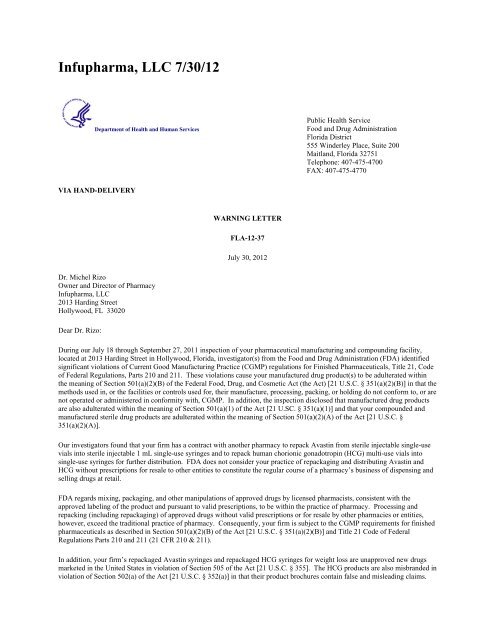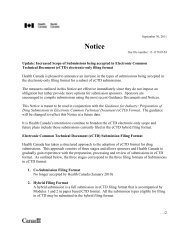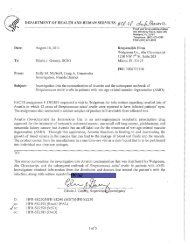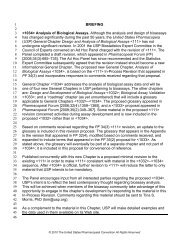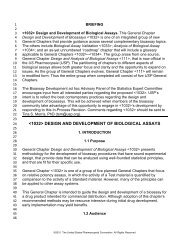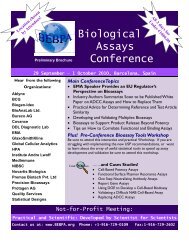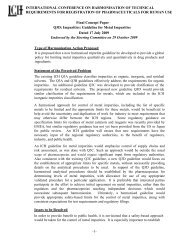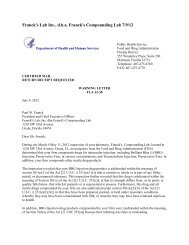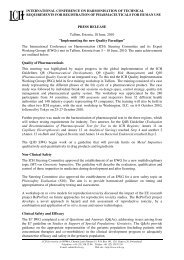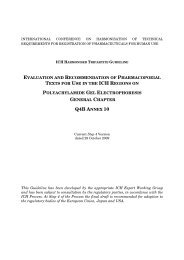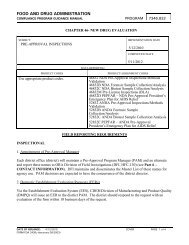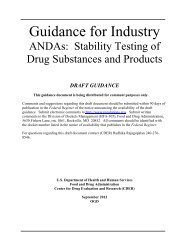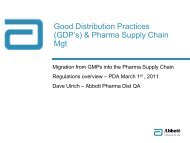FDA warning letter - IPQ
FDA warning letter - IPQ
FDA warning letter - IPQ
Create successful ePaper yourself
Turn your PDF publications into a flip-book with our unique Google optimized e-Paper software.
Infupharma, LLC 7/30/12<br />
Department of Health and Human Services<br />
Public Health Service<br />
Food and Drug Administration<br />
Florida District<br />
555 Winderley Place, Suite 200<br />
Maitland, Florida 32751<br />
Telephone: 407-475-4700<br />
FAX: 407-475-4770<br />
VIA HAND-DELIVERY<br />
WARNING LETTER<br />
FLA-12-37<br />
July 30, 2012<br />
Dr. Michel Rizo<br />
Owner and Director of Pharmacy<br />
Infupharma, LLC<br />
2013 Harding Street<br />
Hollywood, FL 33020<br />
Dear Dr. Rizo:<br />
During our July 18 through September 27, 2011 inspection of your pharmaceutical manufacturing and compounding facility,<br />
located at 2013 Harding Street in Hollywood, Florida, investigator(s) from the Food and Drug Administration (<strong>FDA</strong>) identified<br />
significant violations of Current Good Manufacturing Practice (CGMP) regulations for Finished Pharmaceuticals, Title 21, Code<br />
of Federal Regulations, Parts 210 and 211. These violations cause your manufactured drug product(s) to be adulterated within<br />
the meaning of Section 501(a)(2)(B) of the Federal Food, Drug, and Cosmetic Act (the Act) [21 U.S.C. § 351(a)(2)(B)] in that the<br />
methods used in, or the facilities or controls used for, their manufacture, processing, packing, or holding do not conform to, or are<br />
not operated or administered in conformity with, CGMP. In addition, the inspection disclosed that manufactured drug products<br />
are also adulterated within the meaning of Section 501(a)(1) of the Act [21 U.SC. § 351(a)(1)] and that your compounded and<br />
manufactured sterile drug products are adulterated within the meaning of Section 501(a)(2)(A) of the Act [21 U.S.C. §<br />
351(a)(2)(A)].<br />
Our investigators found that your firm has a contract with another pharmacy to repack Avastin from sterile injectable single-use<br />
vials into sterile injectable 1 mL single-use syringes and to repack human chorionic gonadotropin (HCG) multi-use vials into<br />
single-use syringes for further distribution. <strong>FDA</strong> does not consider your practice of repackaging and distributing Avastin and<br />
HCG without prescriptions for resale to other entities to constitute the regular course of a pharmacy’s business of dispensing and<br />
selling drugs at retail.<br />
<strong>FDA</strong> regards mixing, packaging, and other manipulations of approved drugs by licensed pharmacists, consistent with the<br />
approved labeling of the product and pursuant to valid prescriptions, to be within the practice of pharmacy. Processing and<br />
repacking (including repackaging) of approved drugs without valid prescriptions or for resale by other pharmacies or entities,<br />
however, exceed the traditional practice of pharmacy. Consequently, your firm is subject to the CGMP requirements for finished<br />
pharmaceuticals as described in Section 501(a)(2)(B) of the Act [21 U.S.C. § 351(a)(2)(B)] and Title 21 Code of Federal<br />
Regulations Parts 210 and 211 (21 CFR 210 & 211).<br />
In addition, your firm’s repackaged Avastin syringes and repackaged HCG syringes for weight loss are unapproved new drugs<br />
marketed in the United States in violation of Section 505 of the Act [21 U.S.C. § 355]. The HCG products are also misbranded in<br />
violation of Section 502(a) of the Act [21 U.S.C. § 352(a)] in that their product brochures contain false and misleading claims.
We have reviewed your firm’s response of October 10, 2011 and note that it lacks sufficient corrective actions.<br />
ADULTERATION CHARGES<br />
As you were made aware during the course of the inspection, <strong>FDA</strong> laboratory analysis confirmed the presence of Streptococcus<br />
mitis/oralis, as well as other microorganisms, in samples of Avastin collected during the outbreak investigation. These findings<br />
demonstrate that the affected lots of Avastin prefilled syringes are adulterated within the meaning of Section 501(a)(1) of the Act<br />
[21 U.S.C. § 351(a)(1)] in that the products consist in whole or in part of a filthy, putrid or decomposed substance.<br />
Based on these findings and the findings from the inspection, your products are also adulterated within the meaning of Section<br />
501(a)(2)(A) of the Act [21 U.S.C. § 351(a)(2)(A)] in that they were prepared, packed, or held under insanitary conditions<br />
whereby they may have been contaminated with filth, or whereby they may have been rendered injurious to health.<br />
In addition, the inspection revealed numerous significant violations of the CGMP regulations for finished pharmaceuticals. These<br />
CGMP violations cause the sterile injectable drugs manufactured by your firm—specifically, Avastin and HCG—to be<br />
adulterated within the meaning of Section 501(a)(2)(B) of the Act [21 U.S.C. § 351(a)(2)(B)] in that the methods used in, or the<br />
facilities or controls used for, the manufacture, processing, packing, or holding of the referenced drug products do not conform<br />
with the CGMP regulations.<br />
CGMP violations<br />
The specific CGMP violations observed during the inspection include, but are not limited to the following:<br />
1. Your firm has not established appropriate written procedures designed to prevent microbiological contamination of drug<br />
products purporting to be sterile [21 C.F.R. § 211.113(b)].<br />
For example:<br />
a) Between September 23, 2010, and July 11, 2011, you routinely used single-dose (b)(4)-mL or (b)(4)-mL vials of Avastin<br />
for intravenous infusion to manufacture multiple lots of (b)(4)-mL syringes of Avastin for intraocular injection. Some of<br />
these lots were found to be contaminated with Streptococcus spp. Some of the vials were used over a period of days or weeks<br />
following the initial puncture of the vials. However, the manufacturer’s package insert for Avastin states: “discard any<br />
unused portion left in a vial, as the product contains no preservatives.” There is no assurance of continued sterile integrity<br />
for extended periods in storage once the stopper has been breached and the drug product exposed to the outside environment.<br />
b) You did not validate the aseptic repackaging processes for Avastin and HCG injectables through adequate periodic media<br />
fills performed by all manufacturing personnel in accordance with a written program. Your failure to have all personnel that<br />
process sterile drug products qualified by participation in a media fill could allow personnel with poor aseptic technique to<br />
potentially contaminate drug products.<br />
We acknowledge your written response of October 10, 2011. However, this response is inadequate in that it does not address<br />
your firm’s practice of repackaging the Avastin product from the same bulk vial for extended periods of time after the initial<br />
puncture.<br />
We also acknowledge the commitment in your response to conduct media fills on a regular schedule. However, the schedule<br />
provided with the response indicates that your firm would not perform a new media fill to address this deviation for (b)(4). This<br />
does not address the original violation. The effectiveness of your aseptic process and qualification of each of your employees<br />
should be demonstrated before any further production takes place.<br />
2 Your firm has not established separate or defined areas or such other control systems as are necessary to prevent contamination<br />
or mix-ups during the course of your aseptic processing [21 C.F.R. § 211.42(c)(10)].<br />
For example:<br />
a) You did not perform environmental monitoring of your clean rooms and Class 5 Laminar Flow Workbenches (LAF)<br />
adequately and with the frequency stated in your written program. It is essential that control of environmental conditions be<br />
maintained through timely monitoring to provide assurance of aseptic conditions during your repacking operations.
) On July 20, 2011, <strong>FDA</strong> investigators observed an excessive amount of supplies and components in cartons in the Class 7<br />
buffer area where the Class 5 LAFs and Biological Safety Cabinet are located. On September 19, 2011, investigators<br />
observed several electrical cords and surge protectors on the floor underneath the Class 5 LAFs where they would impede<br />
proper cleaning and sanitization of the floors. Inadequate sanitization of the Class 7 buffer area and excessive materials can<br />
result in increased levels of microbial contamination in the room environment. In addition, personnel activities in the room<br />
could also allow for the transfer of the contaminants into the drug product.<br />
We note your commitment, indicated in the October 10, 2011, response, to conduct environmental monitoring every (b)(4).<br />
However your firm has not justified that this monitoring schedule will ensure that you are able to properly evaluate the<br />
environmental conditions in your facilities. The effectiveness of your environmental controls should be established before any<br />
further production of drug products takes place. In addition, your response does not address the issue of excessive stored<br />
materials in the class 7 buffer area.<br />
3. You failed to ensure that each person engaged in the manufacture, processing, packing or holding of drug product has the<br />
education, training and experience, or any combination thereof, to enable that person to perform their assigned functions [ 21<br />
C.F.R. § 211.25(a)].<br />
For example:<br />
a) Your firm did not conduct any gloved fingertip sampling of your firm’s employees although your firm’s SOP “Sterile<br />
Admixture Quality Control” required all processing personnel to complete and pass the test upon hire and then either (b)(4)<br />
or (b)(4) thereafter, depending on the sterile drug products being processed. Routine gloved fingertip sampling of personnel<br />
performing aseptic manipulations should be conducted to determine if the employees conducting these critical operations are<br />
maintaining their gloves in acceptable condition to protect the drug product from contamination.<br />
b) On July 19, 2011, during a mock demonstration of the repackaging process of Avastin injectable in the Class 5 Biological<br />
Safety Cabinet, an <strong>FDA</strong> investigator observed an employee wearing non-sterile gloves when handling sterile supplies and<br />
products.<br />
c) In preparation for and during your firm’s demonstration of aseptic processes on September 19, 2011, <strong>FDA</strong> investigators<br />
observed you incorrectly don protective clothing, wear a gown which exposed approximately one inch of skin on the wrist<br />
area between your gloves and the gown sleeves, and frequently lean your head and torso inside the LAF which could cause<br />
your product to become contaminated.<br />
The immediate corrective actions described in the response appear to be satisfactory. The implementation of these corrective<br />
actions will be verified during the next scheduled inspection.<br />
We note the statement in your response that your firm had hired a Quality Assurance director who will “be an integral part in<br />
implementation and continued compliance with the steps we are taking.” We expect that this person will play a role in assuring<br />
appropriate training for your firm’s personnel and will be qualified to do so. However, you failed to provide us with any<br />
information regarding the individual’s identity, qualifying education, and/or experience (i.e., curriculum vitae). Please include<br />
this information in your written response to the Warning Letter.<br />
4. Your firm failed to conduct appropriate laboratory testing on each batch of drug product purporting to be sterile and/or<br />
pyrogen-free to determine conformance to such requirements [21 C.F.R. § 211.167(a)]. Your firm did not conduct any finished<br />
product testing, including conformity with microbiological specifications, prior to releasing syringes of Avastin sterile injectable<br />
products (SIPs) repacked for intraocular injection from single-use vials of Avastin for infusion.<br />
We note that your firm’s revised procedures (SOPs 9.003 and 9.005), included with your response, are general in nature and do<br />
not address endotoxin testing or incubation times. Your finished sterile drug products must meet the requirements of current<br />
good manufacturing practices for finished pharmaceuticals. Please revise your procedures to ensure that endotoxin tests and<br />
incubation times for sterility tests are appropriate and meet the requirements for drug products. Furthermore, your firm’s release<br />
procedures should be revised to ensure that endotoxin and sterility test results are reviewed before release and distribution of your<br />
sterile drug products.<br />
5. Your firm did not perform routine calibration, maintenance, and checking of automatic, mechanical, and electronic equipment<br />
used in the manufacture, processing, packing or holding of a drug product according to a written program designed to assure<br />
proper performance [ 21 C.F.R. § 211.68(a)].
For example:<br />
a) The incubator used for the incubation of media fills and environmental monitoring samples had not been qualified,<br />
maintained, or cleaned according to a written program.<br />
b) All thermometers used in the refrigerator, incubator, autoclave, and manufacturing processes lacked calibrations against a<br />
(b)(4) thermometer. The temperatures of your refrigerator and freezer used to store components and finished drug products<br />
must be accurately controlled. Temperatures should be monitored daily.<br />
c) The magnehelic gauges used to measure differential pressure between areas in the clean room lacked calibration records.<br />
We acknowledge the corrective actions described in your response, including the purchase of a new incubator and<br />
recalibration of the magnehelic gauges. However your response did not include any documentation of the recalibration.<br />
Please provide documentation that all of your equipment has been appropriately calibrated and will be appropriately<br />
maintained in the future.<br />
6. Your firm failed to follow procedures for handling of all written and oral complaints regarding drug products [21 C.F.R. §<br />
211.198(a)].<br />
For example, you stated that you received two (2) complaints from two (2) different sources regarding adverse events (i.e., eye<br />
infections) experienced by some patients that received Avastin intraocular injections repacked by your firm. However, as of<br />
September 21, 2011, the complaints were not logged and your firm did not have documentation for the complaint investigation as<br />
required by your SOPs.<br />
Your response references a revised procedure for complaint handling but this procedure was not included with the response.<br />
Please provide an explanation of the measures your firm will take to ensure that your revised procedure will be followed.<br />
7. Your firm does not have an adequate written testing program designed to assess the stability characteristics of drug products in<br />
order to determine appropriate storage conditions and expiration dates [21 C.F.R. § 211.166(a)]. For example, your firm lacked<br />
reliable stability data to support a beyond-use-date (BUD) of 30 days for Avastin SIPs.<br />
We acknowledge the commitment made in your response to follow the recommendations in the USP for beyond-use dating.<br />
Please revise your procedures to ensure that your drug products have the appropriate storage conditions and expiration dates. The<br />
implementation of these corrective actions will be verified at the next scheduled inspection.<br />
8. Your firm has failed to prepare batch production and control records with complete information relating to the production and<br />
control of each batch of drug product [21 C.F.R. § 211.188].<br />
For example:<br />
a) Your firm did not document the number of containers (i.e. syringes and vials) filled per batch on the repackaging records.<br />
b) Batch records for the Avastin product do not accurately record the actual date of manufacture. One of your firm’s<br />
employees stated to the <strong>FDA</strong> investigators that the “Date made” sub-heading on the Avastin Logged Formula Worksheets<br />
was in some cases representative of the date on which the record was printed and not the date on which the Avastin was<br />
repacked. There were numerous instances where the actual date made was different than the date recorded on the batch<br />
record.<br />
c) On July 9, 2011, during a mock demonstration of the repackaging process of Avastin injectable, <strong>FDA</strong> investigators<br />
observed the Pharmacy Technician use a Mini Transfer Device for aliquot purposes. The step involving the Mini Transfer<br />
Device was not included in the Avastin repackaging record.<br />
Your firm’s failure to provide complete information of the batch manufacturing process for each batch could allow your firm to<br />
distribute incorrectly manufactured drug products that pose a risk to patients.<br />
We acknowledge the corrective actions described in your response, including the revisions to SOP 8.008 and retraining of<br />
personnel. However, this revised procedure does not address the specific deficiencies, such as requirements to document the<br />
actual dates of manufacture and quantities of product produced.
Adulterated Drugs-Product Contamination<br />
<strong>FDA</strong> has determined that at least one lot of Avastin 2.mg/0.1ml pre-filled syringes (lot 7072011) manufactured at your facility in<br />
Hollywood, Florida is adulterated within the meaning of section 501(a)(1) of the Act ( 21 U.S.C. § 351(a)(1)) in that <strong>FDA</strong><br />
determined several intact units of the referenced product were contaminated with viable microorganisms.<br />
As stated above, <strong>FDA</strong> laboratory analysis confirmed the presence of several species of Streptococcus, including Streptococcus<br />
Mitus and Streptococcus Oralis in intact, unused, Avastin pre-filled syringes produced by your firm at the Hollywood, Florida<br />
facility. In addition, the CDC and Florida Department of Health have independently tested and confirmed that intact units of the<br />
Avastin prefilled syringes produced at your Hollywood, Florida facility were contaminated.<br />
Adulterated Drugs-Insanitary Conditions<br />
Your Avastin pre-filled syringes and other sterile drug products are adulterated within the meaning of section 501(a)(2)(A) of the<br />
Act (21 U.S.C. § 351(a)(2)(A)) in that they were prepared, packed or held under insanitary conditions whereby they may have<br />
been contaminated with filth, or whereby they may have been rendered injurious to health. The following observations are<br />
examples of insanitary conditions observed by <strong>FDA</strong> investigators during the inspection of your Hollywood, Florida facility.<br />
1. In preparation for and during your firm’s aseptic compounding process for Vancomycin on September 19, 2011, you were<br />
observed to incorrectly don shoe covers, improperly wash your hands and forearms and dry them with kitchen-grade paper<br />
towels, wear a gown which exposed approximately one inch of skin on the wrist area between your gloves and the gown sleeves,<br />
and frequently lean your head and torso inside the LAF and over the product.<br />
2. On September 19, 2011, one of your employees was observed inside the clean room performing a demonstration of the bubble<br />
point test in the Class 5 LAF. The employee’s hairnet was donned improperly, exposing approximately fifteen inches of the<br />
employee’s hair to the environment throughout the entirety of the demonstration. The supervisor did not instruct the employee to<br />
correct the deficiency until the demonstration was completed, after <strong>FDA</strong> personnel brought it to his attention.<br />
UNAPPROVED NEW DRUG AND MISBRANDING CHARGES<br />
In addition, you manufacture and distribute unapproved new drugs in violation of the Act at your firm. Based on the information<br />
collected during the inspection, you manufacture the following drugs, including, but not limited to:<br />
• Avastin (bevacizumab) 1 mL single-use syringes<br />
• HCG (human chorionic gonadotropin) 125 IU injectable syringes<br />
As labeled, the above products are drugs within the meaning of section 201(g)(1) of the Act [21 U.S.C. § 321(g)(1)] because they<br />
are intended for use in the diagnosis, cure, mitigation, treatment, or prevention of disease, or because they are intended to affect<br />
the structure or function of the body. Further, these drug products, as marketed by your firm, are "new drugs" within the meaning<br />
of section 201(p) of the Act [21 U.S.C. § 321(p)] because they are not generally recognized as safe and effective for their labeled<br />
uses. Under sections 301(d) and 505(a) of the Act [21 U.S.C. §§ 331(d) and 355(a)], a new drug may not be introduced into or<br />
delivered for introduction into interstate commerce unless an application approved by <strong>FDA</strong> under either section 505(b) or (j) of<br />
the Act [21 U.S.C. § 355(b) or (j)] is in effect for the product. Based upon our information, there are no <strong>FDA</strong>-approved<br />
applications on file for the above products. The marketing of these products without an approved application constitutes a<br />
violation of these provisions of the Act. Therefore, you should discontinue manufacturing and distributing these unapproved new<br />
drugs at all facilities immediately.<br />
In addition, your sterile injectable HCG products are misbranded within the meaning of Section 502(a) of the Act [21 U.S.C. §<br />
352(a)] in that the statements that, with the use of these drug products, one can experience “rapid weight loss averaging 1 to 3<br />
pounds per day… [and] 20-30 pounds during a 40 day treatment” as claimed in your product brochure “HCG Diet Patient<br />
Packet,” are misleading and, in fact, contradict information for patients found in the labeling for approved HCG injection<br />
products, which states explicitly:<br />
“HCG HAS NOT BEEN DEMONSTRATED TO BE EFFECTIVE ADJUNCTIVE THERAPY IN THE TREATMENT OF<br />
OBESITY. THERE IS NO SUBSTANTIAL EVIDENCE THAT IT INCREASES WEIGHT LOSS BEYOND THAT<br />
RESULTING FROM CALORIC RESTRICTION, THAT IT CAUSES A MORE ATTRACTIVE OR ‘NORMAL’
DISTRIBUTION OF FAT, OR THAT IT DECREASES THE HUNGER AND DISCOMFORT ASSOCIATED WITH<br />
CALORIE RESTRICTED DIETS.”<br />
The introduction or delivery for introduction into interstate commerce of this misbranded product is a violation of Section 301(a)<br />
of the Act [21 U.S.C. § 331(a)].<br />
The violations cited in this <strong>letter</strong> are not intended to be an all-inclusive statement of violations that exist at your facility. You are<br />
responsible for investigating and determining the causes of the violations identified above and for preventing their recurrence or<br />
the occurrence of other violations. It is your responsibility to assure that your firm complies with all requirements of federal law<br />
and <strong>FDA</strong> regulations.<br />
You should take prompt action to correct the violations cited in this <strong>letter</strong>. Failure to promptly correct these violations may result<br />
in legal action without further notice, including seizure and/or injunction. Other federal agencies may take this Warning Letter<br />
into account when considering the award of contracts. <strong>FDA</strong> may reinspect to verify that adequate corrective actions have been<br />
completed.<br />
Through our investigators’ communications with you and the Florida Department of Health (FDOH) during the course of the<br />
outbreak investigation, we understand and appreciate that the affected lots of contaminated Avastin products were voluntarily<br />
recalled. We also understand and appreciate that you voluntarily ceased your Avastin repackaging operations. However, you did<br />
not include any information regarding the Avastin recall nor the status of your firm’s Avastin repackaging operations in your<br />
response to the <strong>FDA</strong> 483. Please include this information in your written response to this Warning Letter.<br />
Your response references information concerning your firm’s repackaging and compounding operations which have already been<br />
“submitted to State.” We assume this information was included in your August 9, 2011, Corrective Action Plan (CAP) and<br />
August 15, 2011 Addendum which you submitted to FDOH and which we received via email from FDOH on August 26, 2011.<br />
However, since you did not include specific reference to and/or include copies of your CAP and Addendum for FDOH in your<br />
response to the <strong>FDA</strong> 483, we cannot be certain. Please clarify in your written response to this Warning Letter.<br />
Within fifteen (15) working days of receipt of this <strong>letter</strong>, please notify this office in writing of the specific steps that you have<br />
taken to correct the violations. Include an explanation of each step being taken to prevent the recurrence of violations, as well as<br />
copies of related documentation. If you cannot complete corrective action within fifteen (15) working days, state the reason for<br />
the delay and the time within which you will complete the correction. If you no longer manufacture or market any of your drug<br />
products, your response should so indicate, including the reasons and the date on which you ceased production.<br />
Please send your response to the U.S. Food and Drug Administration, Attention: Andrea H. Norwood, Compliance Officer, 555<br />
Winderley Place, Suite 200, Maitland, FL 32751. If you have questions regarding any issue in this <strong>letter</strong>, please contact Ms.<br />
Norwood at (407) 475-4724.<br />
Sincerely,<br />
/s/<br />
Emma R. Singleton<br />
Director, Florida District


